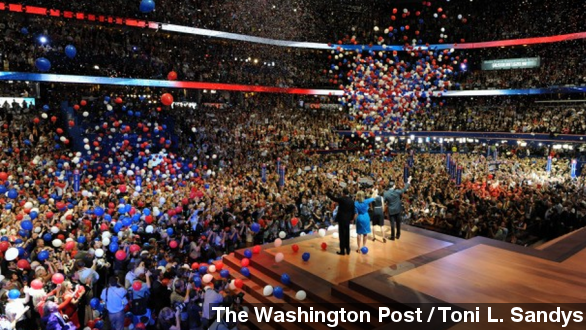Republican leaders have proposed a series of changes that will shorten the party's presidential primary process leading up to 2016.
The GOP has been forced to regroup over the past year after losing what many in the party believed was a winnable race for the White House in 2012. (Via ABC )
Complaining that the party's candidate, Mitt Romney was forced to endure a long, expensive nomination process that hurt his ability to compete against President Obama, the Republican National Committee just announced a plan to streamline the 2016 primary process.
The biggest change: moving the Republican National Convention from August to early June, which would be the earliest for either party since 1948.
That change alone will shorten the primary process by at least two months, ensuring the party picks a candidate in the early summer months. Other changes to the calendar will affect the structure of states' primary and caucus contests.
They will protect the long-established role of four early voting states — Iowa, New Hampshire, South Carolina, and Nevada — while levying harsh penalties against states that try to preempt those primaries or caucuses. (Via Fox News)
The four early states will hold their contests in February, and any states that try to jump them and hold their's earlier will see their number of delegates sent to the convention slashed to nine, or one-third their total delegation — whichever number is smaller.
That punishment would effectively render a state's primary irrelevant. States will also be required to submit their delegate lists to the national party 45 days before the date of the convention — effectively cutting August, July, June and May out of the primary campaigning process.
RNC chairman Reince Preibus called the vote a "historic day" for the party. (Via C-SPAN)
"[We're] no longer going to sit around and allow ourselves to slice and dice for six months, [participating] in a circus of debates ... today I believe was ... very important to the future of our party." (Via CNN)
Jennifer Rubin, a conservative blogger at The Washington Post, praised the chairman's "tough love" idea to streamline the nomination process.
"Priebus correctly recognized that a competent campaign should and must be able to win over the primary voters in a reasonable time period, unite the party, avoid endless and pointless bloodletting and then turn to the general election as soon as possible."
However, MSNBC's Rachel Maddow says while the changes will limit exposure of Republican infighting during the primaries, it will give a major advantage to the frontrunner going into the process.
"There's not going to be any dark horse candidate that comes from behind and wins in a foreshortened primary process. Whoever's got it together from the beginning and looks inevitable is more likely to be the nominee."
The RNC's rank-and-file members are expected to officially approve the proposed primary changes later this year. Potential 2016 Republican convention sites include Las Vegas, Kansas City, Columbus, Denver and Phoenix.


